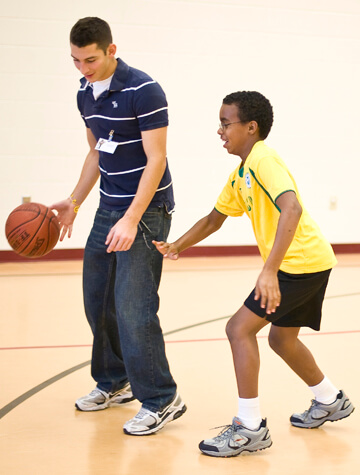Purdue students reach out to the community through Pete’s Pals

Purdue student Giuseppe Bucaro plays basketball with Elijah Keegan during a session of Pete's Pals, a physical activity program for children with disabilities sponsored by Purdue's Department of Health and Kinesiology. (Purdue University photo/Andrew Hancock)
Helping children is what Kevin Richards strives to do with every session of Pete's Pals, a physical activity program for children with disabilities sponsored by Purdue's Department of Health and Kinesiology. For Richards, seeing happy kids is confirmation that his hours of volunteering are worth every minute.
"I think the moment hit me after I had completed the whole program this summer," says Richards, a graduate student in the Department of Health and Kinesiology. "There was this one little boy, the last night of the program, who came running up to me and gave me a big hug and said 'I love you.' I thought, 'Wow.' I felt that I had made a difference through the program."
Richards coordinates Pete's Pals, and he and others at Purdue volunteer each semester to help children and young adults with disabilities stay active. Volunteers are paired with a child and work with them to improve body awareness, strength and other skills.
The volunteers are graduate or undergraduate students at Purdue. The clinicians volunteer to serve as a role model and to help children in Lafayette. They also gain service hours for courses they are taking.
"It's a service learning experience for them," Richards said. "They get to go out into the community, they work with children with disabilities and they don't get monetary or physical benefits from it. We want to help them value service and help them to see the benefits they can derive from volunteering their time."
Families from the community meet at Faith Ministries in Lafayette to participate in the program for five weeks during the fall, spring and summer.
The first hour is spent in the gym. Stations are set up around the basketball court, and children participate in hands-on activities ranging from building blocks to throwing and hitting a baseball. The second hour is spent doing activities in the pool.
During the first session of Pete's Pals, clinicians fill out a needs assessment form called a body skills inventory for their partner. The form evaluates basic motor skills such as throwing, catching, running and jumping. Clinicians use the assessment as a guide to work on areas that need improvement.
Children who participate in the program take away much more than physical benefits. While playing with new friends, kids enjoy an opportunity to socialize and meet others their age, Richards said.
While the children are in the gym stretching, learning and laughing with clinicians, parents have the opportunity to network. During forums called parents' town hall meetings, parents can discuss common problems they face and ways to improve the program.
Carrie Brose has a 6-year-old daughter who has been part of Pete's Pals four times.
"There aren't many activities in the area designed for special needs children," Brose said. "My daughter doesn't have much opportunity to go out into the community and do the same things as other kids. So she can come here and it's a safe way for her to participate."
Richards works with Rhonda Haag, a graduate teaching assistant who teaches an adapted physical education course at Purdue, and Lori Eubank, a special education teacher in West Lafayette, to run the program.
Haag plans the lessons and program content for Pete's Pals, while Eubank serves as the communication link between the parents and Purdue.
"I love seeing college students without disabilities interacting with younger students with disabilities," said Eubank. "It warms my heart to see the smiling faces and the enthusiasm on both sides."
Wes Wilson, a student clinician, has been a volunteer at Pete's Pals for three years.
"When you work with kids with varying levels of disabilities, you get ideas about what these kids can and can't do, but a lot of times they prove you wrong," Wilson said. "Kids exceed what we think they can do."
